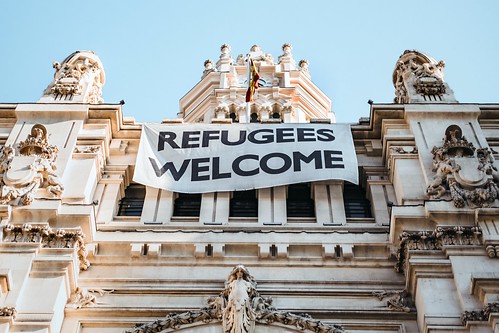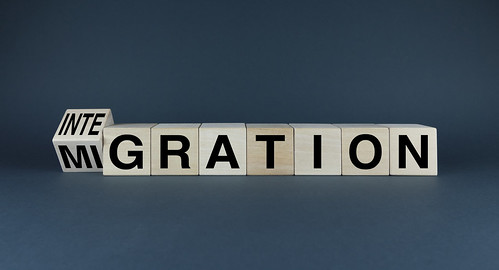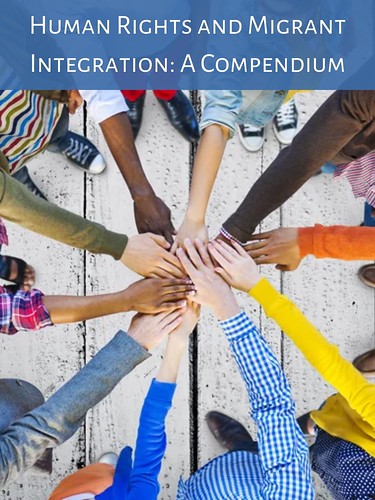Insider Overview: Ukrainian migrant integration in Scotland
In a world marked by uncertainty and discord, families across the UK are welcoming Ukrainian families into their homes, serving as a shining example of compassion and solidarity.

Amidst the backdrop of global crisis, UK families extended their hands to welcome Ukrainian families who had fled Ukraine seeking refuge and a fresh start. For many individuals, this began the start of a journey towards integration and cultural exchange.
This article focuses on Ukrainian migrants arriving in Scotland in the midst of the Ukrainian conflict, and the effects on Scottish families offering help where they can during uncertain times.
Fleeing their war-torn homeland, many Ukrainian families carried the dreams of stability and safety, as well a brighter future. However, with these dreams come the challenges of settling into a new country, including language barriers, unfamiliar customs, and the weight of their past experiences on their shoulders.

Government Assistance
The Scottish Government has played a role in helping Ukrainian families who have sought refuge and integration within Scotland. Resettlement programmes were introduced in collaboration with the UK Government and local authorities with the aim to provide a safe and welcoming environment for those displaced due to conflict and persecution. Support is provided for housing, education, and healthcare needs.
The government has recognised the importance of language skills in the integration process and has supported language programmes in aid of learning English. This includes English language courses and resources to help Ukrainian families, as well as other refugees, to improve their language proficiency, vital for employment, education, and social integration.
It is important to note that these efforts of the Scottish Government are often in collaboration with local authorities, including COSLA, non-governmental organisations, and community groups. This ensures everyone’s voices are heard with the aim of offering an effective integration strategy. The specifics of the assistance provided may vary based on circumstances and available resources at a given time.

Offering a Helping Hand
Like the rest of the UK, families across Scotland felt a deep sense of empathy for Ukrainian families, and felt the need to act. Through opening up their homes to these families and offering help where they can, this was not only a gesture of goodwill but also an opportunity for families to exchange cultures and learn from each other.
I was lucky enough to speak to a Scottish family who kindly welcomed a Ukrainian mother and their child to their home during this time of need. Gavin and Judith Shaw extended a helping hand where they could. They recognised that one of the most immediate needs of Ukrainian families arriving in Scotland was a place to stay. This gesture of hospitality does not only ensure safe housing, but also allowed this family to acclimate to their new surroundings in a safe space.
On top of this, integration into a new country can be emotionally challenging, especially for families who have experienced trauma in their home country. The Shaws offering this family a shoulder to lean on encouraged open dialogue about the challenges and experiences faced, while helping them heal and adapt.
Language and Education
Language barriers can be one of the most challenging aspects of integration. Luckily in the case of the Shaws, the Ukrainian family they were helping could already speak satisfactory English and there was no language barrier between them. This made aiding their journey to integrate that much easier, Linguistic skills were not an issue and communication with regards to any assistance was relatively easy. However, they did mention that had they not spoken fluent English, the whole experience would have been completely different.
Due to limited guidance and aid from either national or local governments regarding language barriers, this has had a large impact on the Ukrainian community that chose to seek safety in Scotland. One example which really stuck with me was learning that Ukrainian children who could speak English were being used as translators for their peers who did not understand the language. Not only is it shocking that nothing has been put in place in the instance of Ukrainian/English language barriers in the classroom, but that other pupils are being used as translators, essentially having negative effects on their personal education and job prospects. A lack of proficiency in the host country’s language can lead to lower academic performance and limited educational opportunities.
In the majority of instances, Ukrainian families are required to seek assistance in terms of language and other needs, instead of being offered the linguistical help one needed in these instances. While it is understandable that it can be difficult to track down every individual that may need assistance, it is essential that is it clear who to ask for their needs. Unfortunately, it has not been made clear to migrants where and who to ask for language support.
An example I have of this is from something interesting the Shaw family mentioned to me during our interview. The use of technology by the Scottish Government and local authorities unfortunately only went so far. While posts on social media were being made in the Ukrainian language, the grammar was so poor that sometimes these posts didn’t even make sense to the Ukrainian family they were helping. Due to this, Ukrainian individuals who are fluent in English have approached the Scottish Government offering their assistance with Ukrainian translations, however, it is not clear if anything has come of this yet.

Room for Improvement
While it is recognised that the Scottish Government and local authorities have made worthy efforts to aid Ukrainian families in seeking refuge and integration during a time of crisis, there is room for improvement. By addressing certain key issues, the Scottish Government can further enhance its support for families seeking safety and a solid foundation to rebuild their lives in Scotland. While the Scottish Government is already working alongside local authorities, closer collaboration can go a long way in these two areas:
Structure:
More structure is needed in order to offer effective resettlement programmes. Clear national guidelines and procedures for receiving housing and assisting families can help advance individuals’ integration into Scottish society. While there are current programmes such as the New Scots Integration Strategy in place, it is evident that this is not being made available in local government areas enough.
More accessible structured integration programs will promote social cohesion by helping newcomers and existing residents connect and understand one another. This will support economic growth and productivity, as there will be more opportunity for navigating a new job in a new country. Additionally, programs which prioritise language proficiency will offer more opportunity for migrants to learn English and help individuals communicate effectively, enhancing their self-confidence, integration, and employability.
A structured integration programme is an investment for long-term success for newcomers and host societies. By making these tools more accessible, the knowledge of becoming self-sufficient and active members of society will become so much easier during an already difficult time.
Language Programmes:
While language programmes already exist in Scotland, expanding their resources is crucial. Through doing so and making language courses more accessible, it ensures that they are available to migrant families across regions will make it easier for families to access language learning opportunities. This will provide a further pipeline for more educational and employment opportunities for displaced families in Scotland.
Through continuously advertising and making language programmes more accessible, host countries can offer newcomers the opportunity to breakdown the language barrier and contribute to their new community. Economic empowerment, access to education, and social inclusion will become so much more accessible through offering such programmes more and making them more captivating for migrants.

Building Bridges
The story of the Shaw family’s generosity and the resilience of the Ukrainian family they helped is only one example of the capacity for compassion and unity within our global community. In a world often divided by differences, stories like these are a powerful example of how someone’s kindness can bring light during the darkest of times. Families opening up their homes to displaced individuals offers and opportunity for sharing cultures and teaching each other more about the world we live in.
The family Gavin and Judith Shaw welcomed into their second home in Perthshire had an interesting story, one of the very many we can find today. Having fled Ukraine, not following the masses for safety reasons, they wound up in Scotland, where they now hope to continue their life. This was a very different experience compared to other Ukrainian families during this time as they were offered the Shaw’s second home, meaning they had the opportunity to have their own space but with the luxury of being offered guidance and connection from the Shaws when needed. Already being able to speak fluent English, the mother was able to integrate into Scottish society through easily finding work very quickly in a high up position for an NGO. When Scottish locals question if she is finding this difficult, she comes back with the response “in Ukraine, my home is being bombed, this is easier to handle than the latter.”
As for her child, they were able to adapt very quickly in school, as the children welcomed them easily and there was an advantage of being able to speak the English language. Friends have been made and adapting to the Scottish education system has gone smoothly so far. While adapting to a new country and its culture, this Ukrainian family seemed to have a unique and lucky transition into the Scottish lifestyle. They have continued to stay in touch with the Shaws and ask for any guidance when needed; it was really inspirational how much they were able to help this family. Through determination from the Ukrainian family and great assistance from the Shaws, the mother has managed to find her small family a home of their own and both are continuously creating a new life in Scotland. The most wholesome part of this story is that both families have planned a holiday together and still keep in touch regularly.
This success story is one of many when talking about Ukrainian migrant integration in Scotland. However, it is also clear that if it weren’t for certain factors benefiting both sides, such as limited language barriers and an enthusiasm to rebuild, this story could’ve gone a whole different way. This is mainly because both families had to do a lot of research in order to build and guide successful integration in Scotland.
While the Scottish Government is trying its best to offer support during uncertain times, it is evident that more needs to be done to offer a clear roadmap to fleeing families—and those helping them—in order to offer more guidance and structure to those most in need of it.

Please click the photo below to read more articles in this series:
Esmee Johnston is the Human Rights and Migrant Integration Editor at Wandering Educators. Motivated by the desire to make a positive impact in the world, is currently studying her master’s degree in Human Rights and Diplomacy at the University of Stirling. This degree is taught in partnership with UNITAR, offering the opportunity for her to broaden her knowledge on human rights matters. She is very passionate about the human rights of migrants and the importance migrant integration has on this topic.























